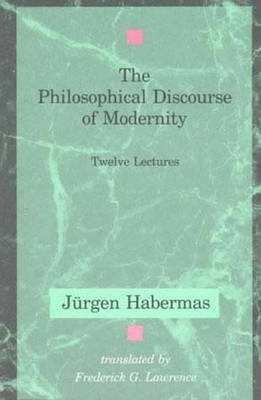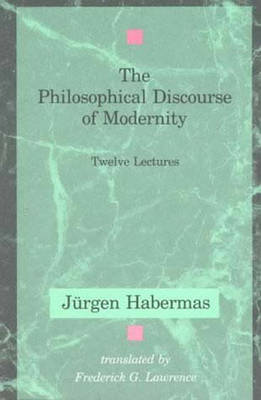
- Retrait gratuit dans votre magasin Club
- 7.000.000 titres dans notre catalogue
- Payer en toute sécurité
- Toujours un magasin près de chez vous
- Retrait gratuit dans votre magasin Club
- 7.000.0000 titres dans notre catalogue
- Payer en toute sécurité
- Toujours un magasin près de chez vous
Description
The Philosophical Discourse of Modernity is a tour de force that has the immediacy and accessibility of the lecture form and the excitement of an encounter across, national cultural boundaries. Habermas takes up the challenge posed by the radical critique of reason in contemporary French poststructuralism. Tracing the odyssey of the philosophical discourse of modernity, Habermas's strategy is to return to those historical "crossroads" at which Hegel and the Young Hegelians, Nietzsche and Heidegger made the fateful decisions that led to this outcome. His aim is to identify and clearly mark out a road indicated but not taken: the determinate negation of subject-centered reason through the concept of communicative rationality. As The Theory of Communicative Action served to place this concept within the history of social theory, these lectures locate it within the history of philosophy. Habermas examines the odyssey of the philosophical discourse of modernity from Hegel through the present and tests his own ideas about the appropriate form of a postmodern discourse through dialogs with a broad range of past and present critics and theorists. The lectures on Georges Bataille, Michel Foucault, Jacques Derrida, and Cornelius Castoriadis are of particular note since they are the first fruits of the recent cross-fertilization between French and German thought. Habermas's dialogue with Foucault--begun in person as the first of these lectures were delivered in Paris in 1983 culminates here in two appreciative yet intensely argumentative lectures. His discussion of the literary-theoretical reception of Derrida in America--launched at Cornell in 1984--issues here in a long excursus on the genre distinction between philosophy and literature. The lectures were reworked for the final time in seminars at Boston College and first published in Germany in the fall of 1985.
Spécifications
Parties prenantes
- Auteur(s) :
- Traducteur(s):
- Editeur:
Contenu
- Nombre de pages :
- 452
- Langue:
- Anglais
- Collection :
Caractéristiques
- EAN:
- 9780262581028
- Date de parution :
- 14-03-90
- Format:
- Livre broché
- Format numérique:
- Trade paperback (VS)
- Dimensions :
- 152 mm x 227 mm
- Poids :
- 612 g

Les avis
Nous publions uniquement les avis qui respectent les conditions requises. Consultez nos conditions pour les avis.






